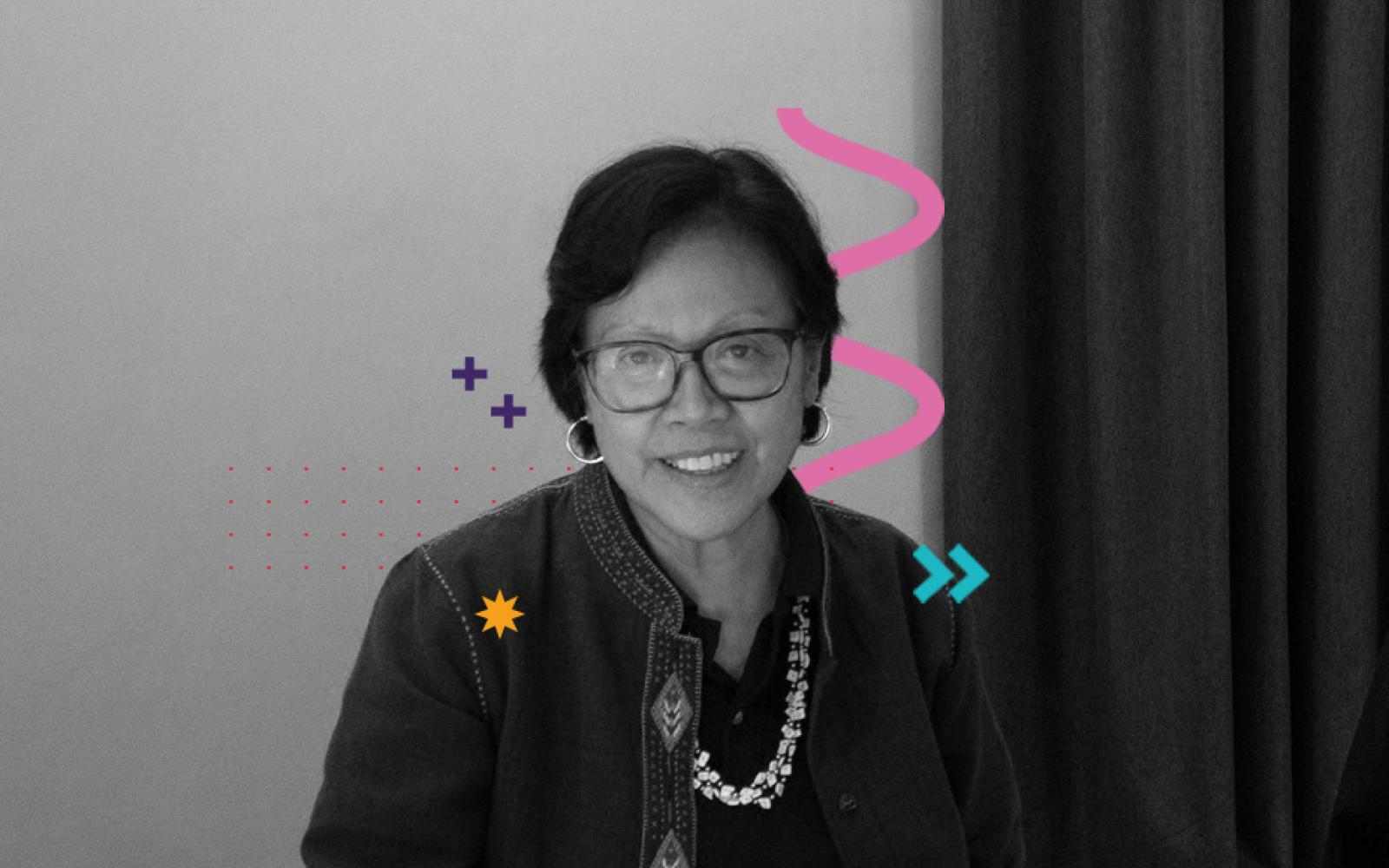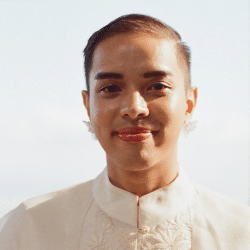Filipino migrants "give back and pay forward" towards an Everyone a Changemaker World when they unlock their changemaking power

There are around 2 million Filipinos who have left their homes to be migrant workers in pursuit of higher incomes for their families. However, the majority are unable to save or invest and become stuck in often lonely and demeaning jobs. Ashoka Fellow Tina Liamzon believes that equipping migrant workers with changemaker skills and mindsets enable them to break from this vicious cycle. Ashoka’s DEI Global Team had a chat with her on why and how she does this kind of impact.
Nico Pablo: Tina, how did you get involved in helping Filipino migrant workers?
Tina Liamzon: When I was living in Rome with my husband in 1990, I got exposed to our Filipino migrants, many of whom would go to the same churches that we went to for Filipino Masses. In the mid 1990s, I joined a group of Filipinos living in other parts of Europe interested in diaspora concerns. I also joined the Filipino Catholic Chaplaincy in Rome, which brought together over 40 Filipino Catholic communities and together with my husband, helped form the Chaplaincy's Family and Youth Ministry in 2005. My husband and I also did a small study on the situation of Filipino youth in Rome. From that, we, along with a few friends and then Dean of the Ateneo School of Government, Tony La Vina, set up a Leadership and Social Entrepreneurship Program for Filipino migrants in 2008.
Nico Pablo: What were the main problems you wanted to address at that time? How different are these today?
Tina Liamzon: The study that I undertook in 2005 found that the Filipino youth in Rome, who were growing in numbers as part of the reunification program of the Italian government, were experiencing problems in integrating into Italian culture and the school system. Many dropped out of school as they neither had the sufficient language skills nor the support from their families to adjust and cope with living in Italy. They were falling into dysfunctional behaviors with all forms of substance abuse and even teenage pregnancies.
Another major challenge for Filipino migrants was their lack of financial literacy. Filipinos who are mostly employed as domestics or caregivers had much higher incomes compared to what they would receive in the Philippines even working as professionals. However, large numbers of Filipinos were unable to save or invest these hard-earned incomes to retire with the lifestyle that they have gotten used to living abroad. Many found it difficult to say 'no' to the never-ending demands of their families in the Philippines - which would tend to be more 'wants' rather than needs. And so, when there would be emergencies, many migrants get into serious financial debts as they had little or no savings to meet these emergencies. Others had no clear financial goals to begin with so they couldn't plan properly on how much they would need to save regularly and find investments that could increase their savings without falling into financial scams.
I believe that in the past few decades, the Italian government has improved its programs for migrants to integrate more easily into Italian society, including for migrant children in schools. There are more and more stories of Filipino children (who were brought up in Italy at younger ages) being able to adapt and adjust more smoothly into the school system and have been doing very well, graduating from Italian schools armed with professional degrees. I think that discussions and programs of the church to assist youth and families have also increased and I would like to think that the ALSE Program that we started has encouraged many of our migrants to empower themselves on their personal financial management and even their entrepreneurship and social skills so that they can be more efficient and effective in setting up their businesses or social enterprises.
Nico Pablo: Can you tell us what you do at ALSE OF-LIFE?
Tina Liamzon: My husband and I started the ALSE program, then called just LSE (Leadership and Social Entrepreneurship) Program with a migrants' group in 2008. I basically coordinated the program in its beginnings until 2018 when my husband took over more of the coordination work. We identified the topics and speakers who could cover the sessions of the program's three modules on Leadership, Financial Literacy, and Social Entrepreneurship. Each module has 4 sessions of 6-7 hours each. After a total of 12 sessions, each student (either individually or as a group) develops a social enterprise/social innovation plan to present to the class. We recruited and mobilized volunteers both in Rome and Manila and elsewhere with the qualifications and skills to teach. We were very fortunate that we have so many committed and dedicated volunteers as resource persons and mentors as well as start-up secretariats to organize and run the programs in the different cities and countries. At present, we have reached a total of 32 countries in Asia, MENA, Europe and the Americas graduating almost 5,000 students since 2009.
My work currently is more focused on the forward-looking strategies for the sustainability of the program. This mainly concerns the continuing education for our volunteer-run secretariats in the different countries, especially on values formation, and keeping the motivation of our volunteers to serve not just in the ALSE OF-LIFE but in other sectors they may be interested in. The mantra of the program is to 'give back' and 'pay forward' and become agents of change and transformation as servant leaders.
Nico Pablo: You help Filipino migrant workers build their social entrepreneurship and financial literacy so that they eventually don’t have to leave their families to work. What impact have you seen with your work over the years?
Tina Liamzon: The biggest impact we've seen over the 15 years of the program has been the change in mindsets of the graduates, a sense of being empowered, whether it's in taking more control over their personal finances or learning new knowledge and leadership skills such listening, communicating more effectively, and developing a social innovation or enterprise business plan. It has been very encouraging and inspiring to listen to their stories of hope and transformation after taking the 6-month course.
Nico Pablo: What big changes happen when OFWs are changemakers? Why should migrants be changemakers?
Tina Liamzon: The big changes have to do with their becoming much more active in volunteering for and even outside the ALSE program. We have graduates who have become more active leaders in their church or faith groups and civic associations, in helping other migrants, and in collaborating with the Philippine embassies and consulates. They recognize the importance of their 'giving back and paying forward' to others beyond only themselves or their families, but likewise, to their communities and to society.
Nico Pablo: How should society shift to help create more migrant changemakers?
Tina Liamzon: Society needs to provide more opportunities for a more thorough and integrated orientation for would-be migrants on the whole migration process. For one, this includes what to expect when they live and work abroad. They should also be able to develop personal financial management which can help them to meet their financial goals and return to their families in the Philippines sooner rather than later. This financial education should also cover social investments that the migrants and their families can invest in, such as cooperatives in their hometowns which can contribute to the local economic development in their areas. The role that migrants can play in their host countries or when they reintegrate back into Philippine society as changemakers also needs to be highlighted in pre-departure or post-arrival seminars. Programs such as the ALSE OF-LIFE seek to open up the hearts and minds of migrants precisely to help make them more aware that they can help themselves, their families, as well as their communities and society.
Nico Pablo: What are three practical actions you would recommend for anyone who wants to collaborate on migration?
Tina Liamzon: 1. Talk with migrants or migrant returnees and listen to their stories, their struggles, challenges, failures and successes;
2. Understand the differences in the types of migrants and migration which encompass regular migrants or those who undergo their migration experience following the laws set by sending and destination countries, as well as migrants who are refugees, asylum seekers, trafficked persons;
3. Link up with migrants' associations and networks to know about the work they're doing and exploring possible areas of collaboration.
Note: Minor edits have been applied for clarity.
*****
About the Ashoka Fellow
Cristina Liamzon, PhD is a development consultant with over 4 decades of involvement with civil society organizations on issues of agrarian reform and rural development, food security, sustainable livelihoods, local economic development and migrant concerns. Tina holds a BA in Economics from the University of the Philippines, a Master in Public Administration from the Harvard Kennedy School where she was also a Mason Fellow, an MSc in Human Settlements Planning from the Asian Institute Technology in Bangkok and a PhD in Social Science from the Pontificia Universita Gregoriana in Rome. She co-founded and jointly coordinates the Ateneo LSE Training and Empowerment Program for migrant Filipinos together with her husband, Edgar Valenzuela. She is currently a core-faculty of the Ateneo School of Government and part-time lecturer at the Loyola Schools. Her other advocacies focus on promoting health and wellness through plant based foods particularly for vulnerable and marginalized groups and on protecting and saving the environment, through more simple living.
